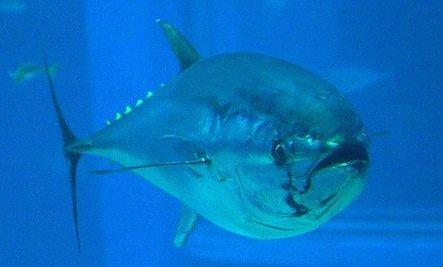If you have been following the news at all, you probably are aware that wild tuna are being overfished and overconsumed at such a rate, some of them may be driven into extinction. Tuna is one of most-consumed fish on the planet. Even though over half of the tuna species are in danger, the most popular canned-tuna brands are promoting tuna consumption even more.
“This is the first time that America’s ‘Big Three’ canned-tuna brands StarKist, Bumble Bee and Chicken of the Sea – have united to deliver a marketing campaign of this magnitude”, said Gavin Gibbons, NFI’s director of media relations. (Source: seafoodsource.com)
It appears that some industries have no regard for the environment and instead obsessively focus on profits, even if it means sometime down the line the natural resource their companies depend upon is exhausted.
Bluefin tuna in particular, are very popular with sushi fans and as a result of the voracious consumption are perilously close to collapse. You might imagine the U.S. government would intervene and protect them, but this is not the case, “The Obama administration in May declined to protect the Atlantic bluefin tuna under the Endangered Species Act.” (Source: LA Times)
The great majority of bluefin is eaten in Japan, but sushi has become quite popular in the affluent Western countries, so there is extra demand for it. Baja Aquafarms is trying to grow and manage bluefin tuna in about twenty to thirty pens located in the waters of northern Baja California, near the Coronado Islands. Their farming practice is not conventional though, because it depends on catching wild bluefin and then using the pens to fatten them, rather than for breeding. The downside of this method is they are removing young tuna from oceans, and they do not reproduce which both diminishes the population and the dwindling gene pool.
In Japan, bluefin tuna have been raised from eggs to maturity and sold for consumption, but this happened only at one university, according to the LA Times.
If this full cycle tuna aquaculture can ever be made into a consistently repeatable commercial process and expanded to other tuna species, then it could take pressure off the remaining wild tuna.
The other option is to have the large canned-tuna companies stop aggressively promoting their tuna products, but considering their past and present behaviour, this contingency seems very unlikely.
Adapted from an article by Jake R. (which originally appeared on “Healthy Living”)




